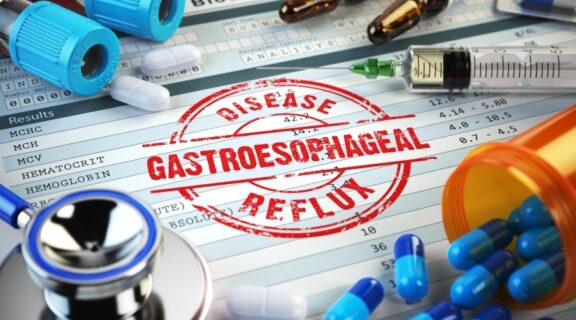Gastroesophageal reflux disease (GORD) is a condition where acid flows from the stomach into the oesophagus. This causes irritation and inflammation, leading to symptoms such as chest pain, coughing, hoarseness, and regurgitation.
Modern treatments for GORD focus on either neutralising the acid or reducing its production. Lifestyle modifications and pharmacological interventions are the first-line GORD treatment. However, if this fails to alleviate symptoms, patients can opt for further testing and even surgical treatment.
In this guide:
Modern Treatments for GORD
The primary problem with GORD is the presence of acid in the oesophagus. If the acid is neutralised or the production is reduced, then the symptoms and damage from acid reflux are minimised. However, when symptoms prevail despite GORD treatment, more invasive interventions are considered.
Modern treatments for GORD escalate from lifestyle changes and non-prescription medications to prescription medications and surgery. Each new treatment is only administered when the previous stage failed to control symptoms.
Lifestyle Modifications
The first-line treatment for acid reflux is a lifestyle change. GORD is often associated with a diet high in fatty foods, smoking, and other lifestyle factors. A doctor will likely advise a patient to:
- Lose Weight. Weight loss is crucial to minimising GORD symptoms. Obesity is closely linked to the prevalence of GORD.
- Reduce Trigger Foods. GORD symptoms occur, in part, due to excess production of acid. Foods such as coffee, alcohol, acidic liquids (e.g., carbonated beverages,) spicy foods, and fatty foods all irritate the stomach or cause acid production. Reducing the intake of these foods can alleviate symptoms.
- Eat Smaller Meals. Large meal sizes can cause difficulty for people at risk from GORD. Eating smaller meals reduces the risk of acid reflux.
- Quit Smoking. Smoking weakens the oesophageal sphincter and increases stomach acid production, worsening GORD symptoms. Quitting can significantly improve oesophageal health.
- Keep Your Head Elevated. When people lie down to sleep, the effects of gravity mean that acid is free to flow into the oesophagus. Keeping the head prompted up in bed prevents acid from backflowing.
Non-Prescription Medications
Patients often take non-prescription medications to combat acid reflux before visiting the doctor. These medications are highly effective in most individuals and instances of one-off acid reflux. It’s when the symptoms are prolonged that there is cause for concern.
Common non-prescription medications include:
- Antacids neutralise stomach acid. Antacids are alkaline tablets that, when exposed to acid, react to produce carbon dioxide. This neutralises the acid and prevents any oesophageal irritation. It should be noted that antacids don’t treat the underlying cause of the condition. Consuming too many antacids can cause side effects such as diarrhoea and kidney damage.
- H2 Blockers. Histamine 2 blockers target receptors in the stomach to downregulate acid production. These oral pills decrease acid production for up to 12 hours but don’t produce the instant relief associated with antacids. Examples include cimetidine (Tagamet HB), famotidine (Pepcid AC) and nizatidine (Axid).
Some patients may take anti-inflammatory medications like NSAIDs if they’re feeling significant discomfort. These medications can relieve the inflammation. However, their side effects are linked to the stomach, raising concerns about the potential risks of long-term use.
Prescription Medications
When a patient visits the hospital with prolonged acid reflux, the doctor may prescribe long-term medication. Usually, the medications are accompanied by lifestyle advice unless the doctor suspects a medical cause of the acid reflux. It’s not uncommon for patients to take these medications for several years – especially if the acid reflux is a side effect of another medication, e.g., an antidepressant.
These GORD treatments include:
Proton Pump Inhibitors (PPIs)
Acid production involves pumping hydrogen ions (protons) into the stomach to lower the pH level. Blocking the action of these pumps prevents acid production, thereby raising the pH level. It’s the most direct way to tackle acid reflux. PPIs are a common treatment for GORD.
Examples include esomeprazole (Nexium), lansoprazole (Zoton), omeprazole (Losec), pantoprazole (Protium), rabeprazole (Pariet) and dexlansoprazole (Dexilant).
Despite being well-tolerated, side effects can include nausea, headaches, diarrhoea, and rarely low vitamin B12 or magnesium levels.
Prescription-Strength H2 Blockers
Some H2 blockers are more potent than others. A doctor may prescribe an H2 blocker if a patient is experiencing severe side effects from PPIs. Examples include famotidine and nizatidine. Unlike PPIs, H2 blockers are extremely well tolerated. However, they’re not as effective at reducing acid levels in the stomach.
Surgery for GORD
All modern treatments for GORD opt for a non-invasive approach first. Conservative treatments cause less damage to the body and alleviate symptoms effectively. In some patients, however, non-invasive GORD treatments are not effective.
Other reasons for GORD surgery include:
- Severe Oesophagitis: Chronic inflammation of the oesophagus due to acid reflux that doesn’t heal with medication may require surgical intervention to prevent further damage.
- Barrett’s Oesophagus: This condition involves changes to the cells of the lower oesophagus, potentially leading to cancer. Surgery may be advised to manage severe cases or those with dysplasia (pre-cancerous changes).
- Structural Abnormalities: Conditions like a hiatal hernia, where part of the stomach pushes into the chest cavity, might necessitate surgery if they significantly contribute to reflux and cannot be managed with medications alone.
- Complications from GORD: Strictures (narrowing of the oesophagus), severe regurgitation affecting the lungs, or chronic bleeding are complications that might require surgical treatment.
Surgical procedures involve tightening or supporting the oesophageal sphincter – which lies between the oesophagus and stomach – to prevent the backflow of acid. Potential procedures include fundoplication, transoral incisionless fundoplication, and a LINX device.
Learn more about surgical procedures for severe acid reflux.
Ready to learn more about GORD and acid reflux? See our GORD and reflux information page for further details. Alternatively, call us on 0207 486 7777 or send us an email at admin@thefunctionalgutclinic.com.

